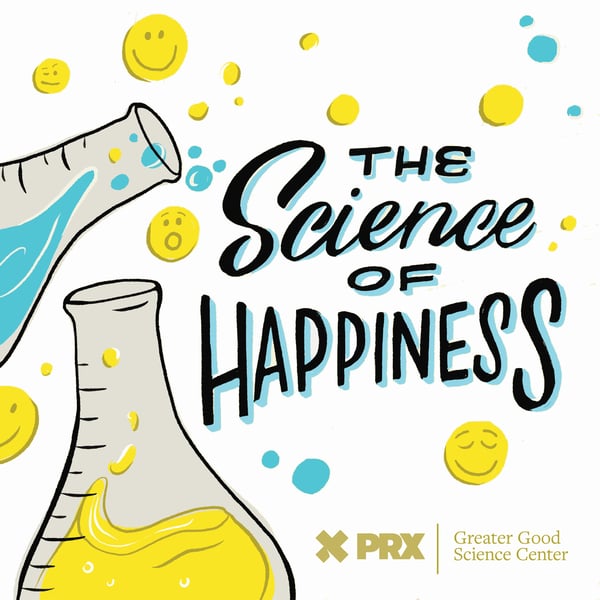When It's Hard To Connect, Try Being Curious
The Science of Happiness
PRX and Greater Good Science Center
4.4 • 1.9K Ratings
🗓️ 7 December 2023
⏱️ 18 minutes
🧾️ Download transcript
Summary
Join our limited newsletter The Science of Habits to get curated, science-backed tips to help make your New Years resolution stick in 2024.
https://ggsc.berkeley.edu/podcasts/habits
When we're more curious, we are more likely to be happier and have stronger relationships. Try deepening your curiosity with these science-backed practices from author Scott Shigeoka.
Link to episode transcript: https://tinyurl.com/276u4yxu
Episode summary:
As a cardiologist and immigrant in the United States, Stephanie Hsiao has always placed an emphasis on advancing her skills in order to succeed. So when she received the diagnosis that her son was neurodiverse, Stephanie went immediately into action mode to help her son — but she felt like she was missing something. For our show, Stephanie tried a practice to cultivate “deep curiosity,” and found that a curious outlook helped her to check her assumptions about parenting and discover her son’s strengths and interests. Later, we hear from curiosity expert Scott Shigeoka about the difference between shallow and deep curiosity, and how it can help us forge stronger connections with others.
Practice:
Before engaging in curiosity: Slow down, focus on your breathing. Set an intention to focus on curiosity and maybe visualize yourself being curious.
While in conversation: Be open to being wrong, continuously check your assumptions, and actively turn towards those who are seeking your attention.
Going forward: Make commitments to yourself and with others to engage in difficult, but open-minded interactions.
Today’s guests:
Stephanie Hsiao is a mother and cardiologist based in San Francisco, California.
Scott Shigeoka is an author and storyteller who focuses on themes of curiosity and well-being.
Order Scott Shigeoka’s book Seek: How Curiosity can Transform Your Life and Save the World: https://tinyurl.com/4jrxbupj
Learn More About Scott’s work: https://tinyurl.com/y5xyxky7
Follow Scott on Instagram: https://tinyurl.com/3acu6jhm
Follow Scott on Twitter: https://tinyurl.com/3m3k3bm9
Resources from The Greater Good Science Center:
Six Surprising Benefits of Curiosity: https://tinyurl.com/7kcr32su
How to Stay Open and Curious in Hard Conversations: https://tinyurl.com/y2f2e9ce
Why Curious People Have Better Relationships: https://tinyurl.com/2xw5y9yr
Does Curiosity Have a Dark Side? https://tinyurl.com/5n88wzyd
How Curiosity Can Help Us Overcome Disconnection: https://tinyurl.com/9kaas6nz
More Resources on Curiosity:
BBC - Curiosity: The neglected trait that drives success: https://tinyurl.com/38bubaak
Harvard - A Curious Mind: https://tinyurl.com/324hyzv4
TED - How Curiosity Will Save Us: https://tinyurl.com/muswe2y5
Tell us about your experience with being curious. Email us at [email protected] or use the hashtag #happinesspod.
Help us share The Science of Happiness!
Rate us on Spotify and share this link with someone who might like the show: https://tinyurl.com/m6aezjce
This episode was supported by a grant from the John Templeton Foundation, as part of our project on "Expanding Awareness of the Science of Intellectual Humility." To learn more, go to https://tinyurl.com/2dj6hw29
Transcript
Click on a timestamp to play from that location
| 0:00.0 | When my son was five years old, we were notified by the school that there's something |
| 0:10.4 | disconnecting. He seems to be comprehending everything and able to verbalize everything. |
| 0:18.0 | But when he's asked to write things down, the letters would be backwards or mirror images. |
| 0:25.0 | That was kind of like the first clue of neurodiversity or traditionally learning disability. |
| 0:31.0 | It really scared me. It was devastating to be very honest. I have a lot of fear |
| 0:38.1 | because I was so worried he's not going to make it in life. I am 100% Chinese and grew up in |
| 0:47.3 | Taiwan and my husband's half Iranian. I think the reality is that to a lot of immigrants even second generations, we realize |
| 0:58.0 | that in order to be in this American life, we need to acquire skills. |
| 1:05.0 | For the longest time, I focus on what is not meeting the standards |
| 1:10.0 | and not seeing that he is actually gifted in others. Welcome to the Science of Happiness, I'm Dacker Kilner. |
| 1:29.0 | Curiosity is a tool that science has shown can strengthen our relationships and make us more |
| 1:34.3 | likable. It can help us hold on to a sense of meaning in our lives and it even can lift |
| 1:40.0 | our moods. Our guest today is Stephanie Shaw, a cardiologist at a leading Bay Area Hospital. |
| 1:47.0 | Madison is her life's work, but she says her other life's work that of being a parent is far more challenging and humbling. |
| 1:54.0 | Stephanie was challenged as so many parents and caretakers are |
| 1:58.0 | by some surprises about her son. |
| 2:01.0 | She wanted to know if being more curious might help her change how she |
| 2:04.7 | approaches those difficulties. So we gave her some tips. They come from author |
| 2:09.6 | Scotti Gioke whose new book is called Seek, how curiosity can transform your life and change the world. |
| 2:15.4 | It offers science-based techniques to cultivate deep curiosity and we're going to |
| 2:21.0 | hear more about that from Scott later in the show. |
| 2:23.8 | The powerful piece about deep curiosity is it doesn't just help you to collect information. |
... |
Please login to see the full transcript.
Disclaimer: The podcast and artwork embedded on this page are from PRX and Greater Good Science Center, and are the property of its owner and not affiliated with or endorsed by Tapesearch.
Generated transcripts are the property of PRX and Greater Good Science Center and are distributed freely under the Fair Use doctrine. Transcripts generated by Tapesearch are not guaranteed to be accurate.
Copyright © Tapesearch 2025.

